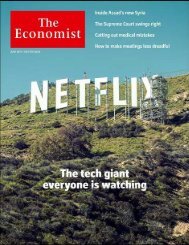Fortune
You also want an ePaper? Increase the reach of your titles
YUMPU automatically turns print PDFs into web optimized ePapers that Google loves.
FOCUS<br />
that they reduced medical costs were inconclusive,<br />
and today many consist of little more<br />
than perks such as on-site weight-loss clinics<br />
and rebates at local gyms. Still, according to<br />
the Society for Human Resource Management,<br />
59% of employers ofer some form of<br />
wellness program, and 24% ramped up their<br />
oferings in 2017.<br />
Instead of dwelling on cost reduction, Exos<br />
emphasizes the value of getting the most out<br />
of employees when they’re at work, while<br />
framing its services—from fitness coaching<br />
to preparing meals at company cafeterias—as<br />
perks that help retain staf. The company now<br />
serves 25<strong>Fortune</strong> 100 companies and a range<br />
of hedge funds and venture capital firms,<br />
among many others. Health insurer Humana,<br />
a client since 2015 for which Exos manages<br />
10 fitness centers, says the partnership has<br />
decreased absenteeism and become part of its<br />
strategy to keep top employees in the fold.<br />
Revenues at the privately held Exos are<br />
on track to hit $200 million this year, the<br />
company says, after registering percentage<br />
growth in the mid-teens in recent years. That<br />
trajectory has attracted A-list dealmakers: In<br />
March, Madrone Capital Partners, the investing<br />
vehicle of members of Walmart’s founding<br />
PAIN RELIEVER<br />
An Exos client<br />
gets an evaluation<br />
with 3D<br />
Movement<br />
Quotient (3DMQ),<br />
a diagnostic system<br />
designed to<br />
help reduce workrelated<br />
injuries.<br />
family, and BDT—the firm run by Byron Trott,<br />
Warren Bufett’s investment banker—together<br />
took a majority stake. (The firms declined to<br />
specify the dollar value of the investment.)<br />
Exos, based in Phoenix, was founded by<br />
Verstegen in 1999 as a company focusing on<br />
pro athletes. Early clients included soccer<br />
star Mia Hamm and NFL all-pro J.J. Watt;<br />
the company went on to serve elite military<br />
personnel, including Navy SEALs.<br />
By 2010, Exos had begun pivoting toward<br />
the corporate world, guessing that top execs<br />
would see a greater need for its services. “The<br />
key is to create a culture of health, and you<br />
really need corporate leadership to support<br />
that,” says Harry Liu, a researcher at think<br />
tank Rand who studies workplace health programs.<br />
To contribute to such a culture, it turns<br />
out, Exos had to acknowledge just how few<br />
people truly do hard-core exercise. The typical<br />
wellness program might attract 10% of a<br />
company’s workforce, Exos says, but it can get<br />
participation up to around 40% by focusing<br />
on lifestyle choices, nutrition, and ergonomic<br />
movement rather than boot-camp intensity.<br />
“What we’re riding is the dissatisfaction<br />
with reactive health care,” says Verstegen. And<br />
of course, “we’re riding the war for talent.”<br />
www.t.me/velarch_official<br />
31<br />
FORTUNE.COM // JULY.1.18
















